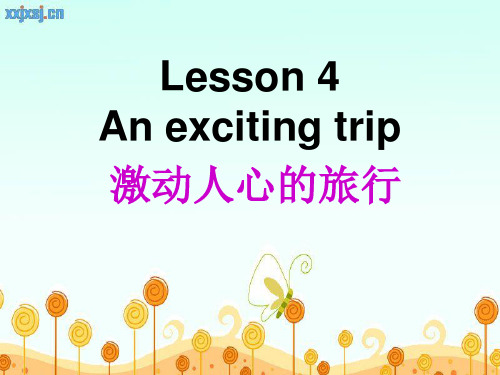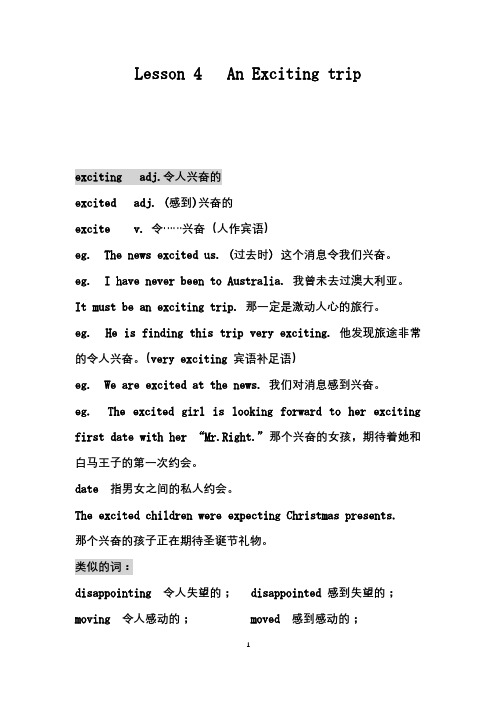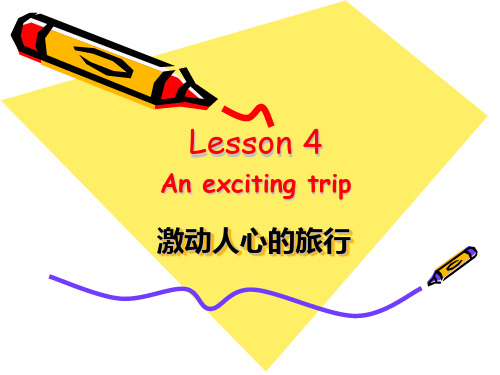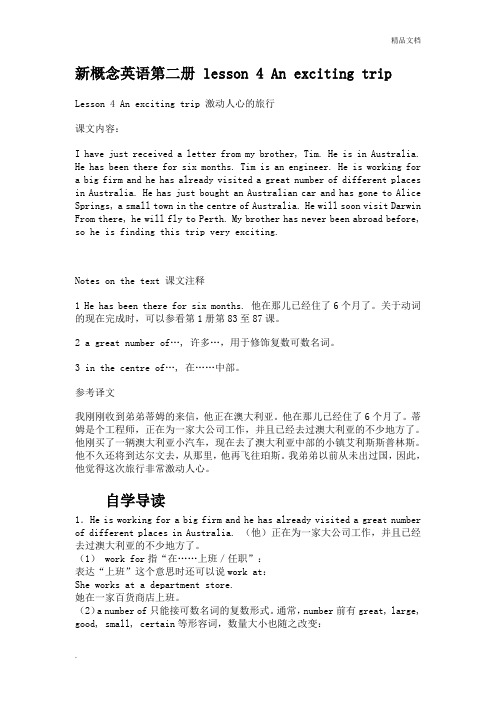lesson4 An exciting trip 激动人心的旅行
新概念二Lesson 4

3. I (took) (received) ———— the letter with me. ———— some flowers 4. He has (taken) (received) to her. ———— (take) this book 5. Why did you (receive) off the shelf.
E Read these two sentences. I've already had lunch. Have you had lunch yet? Ask questions in the same way. 1. I've already seen the new play at ‘The Globe’. Have you seen the new play at ‘The Globe’ yet
4. Where is he?
He is in Australia.
5. How long has he been there? He has been there for six months. 6. What’s his job?He is an engineer.
No ,he isn’t. 7. Isn’t he a mechanic?
He has just bought an Australian car and has gone to Alice Springs, a small town in the centre of Australia. He will soon visit Darwin. From there, he will fly to Perth. My brother has never been abroad before, so he is finding this trip very exciting.
新概念英语第二册笔记:Lesson 4 An Exciting trip

Lesson 4 An Exciting tripexciting adj.令人兴奋的excited adj. (感到)兴奋的excite v. 令……兴奋(人作宾语)eg. The news excited us. (过去时) 这个消息令我们兴奋。
eg. I have never been to Australia. 我曾未去过澳大利亚。
It must be an exciting trip. 那一定是激动人心的旅行。
eg. He is finding this trip very exciting. 他发现旅途非常的令人兴奋。
(very exciting 宾语补足语)eg. We are excited at the news. 我们对消息感到兴奋。
eg. The excited girl is looking forward to her exciting first date with her “Mr.Right.”那个兴奋的女孩,期待着她和白马王子的第一次约会。
date 指男女之间的私人约会。
The excited children were expecting Christmas presents.那个兴奋的孩子正在期待圣诞节礼物。
类似的词:disappointing 令人失望的; disappointed 感到失望的;moving 令人感动的; moved 感到感动的;touching 令人感动的; touched 感到感动的;embarrassing 令人尴尬的; embrassed 感到尴尬的;surprising 令人惊讶的; surprised 感到惊讶的;shocking 令人震惊的; shocked 感到震惊的;satisfying 令人满意的; satisfied 感到满意的;receive v. 收到reeive sth from sb. 从……收到……;receive a letter 收到一封信;receive a present 收到一份礼物;receive a phone call 接到一个电话;receive good education 受到良好的教育;eg. You will receive a warm welcome whenever you come to my home. 无论你们什么时候来我们家,你都将受到热烈欢迎。
新概念二Lesson 4 An exciting trip

• ★firm n. 商行, 公司 • company • big company=firm
他已经在这个公司工作三年了。 他一年前在这个公司工作。 他将从明年开始在这个公司工作。
• • • •
★different adj. 不同的 difference n. be different from The difference between A and B is
What is Tim’s job? Who is an engineer?
I have just received a letter from my brother, Tim. He is in Australia. He has been there for six months.
for He is working ____a big_____ and he has firm already visited a great number of different ______________________places in Australia.
He _________there for six months. has been
Where has he been for six months? How long has he been there for? Who has been there for six months?
engineer . Tim is an_________
• • • • • • •
He has just bought an Australian car and has gone to Alice Springs, ________ a small town in the centre of ____________Australia. What has he just buy? Where has he gone to? Where is the Alice Springs? Is Alice Srings a big town?
新概念英语lesson4Anexcitingtrip

• 6. abroad adv. 在国外(in or to another country; overseas ) be abroad 在国外 go abroad 到国外 live abroad 住在国外 travel abroad 在国外旅游 home and abroad 国内外
(2) difference n. 差别,差异
tell the difference between A and B 分辨A和B的差别
(3) 以ant/ ent结尾的为adj. 以ance/ence结尾的为n.
important adj. 重要的
importance n. 重要性
patient adj. 有耐心的
surprised 惊喜的
disappointing
disappointed 失望的
• 2. receive v. 收到(客观事实)
(1) receive sth. from sb. 从某人那收到某物
receive a letter from sb. = hear from sb.
收到某人的来信
(2) accept v. 接受(主观愿望)
• I have just received a letter from my brother, Tim.
Tim用来解释brother的名字
同位语 ——对前面一个名词进行进一步的
解释和说明
My boss, Mr. Williams, will meet me in the afternoon.
I’d like you to meet my friend, James.
• 3. firm
(1) n. (口语)公司 company (更口语化)公司 corporation 公司,法人 enterprise 事业单位,企业
Lesson 4 An exciting trip 激动人心的旅行 - 课文讲解

6. He has just bought an Australian car and has gone to Alice Springs, a small town in the centre of Australia.
b. Yet
“已经” ; 用于疑问句,常放在句末。
c. Yet “仍然,还” ; 用于否定句,常放在句末。
在使用非延续动词时:应注意以下四点 1. 非延续动词不能与for 引导的表示一段的时间状语连用。 2. 非延续动词不能与how long 引导的疑问句连用。 3. 非延续性动词不用于进行时态,若是进行时态形式应译成将来时态的意思。 4. 非延续性动词与until引导的时间状语从句连用时,只能用于否定形式,不能用于肯定
2. He is in Australia.
3. He has been there for six months. have/has been to 意思是:“到过,去过...”,
表示曾经到过某地,但现在人已经不在那儿。
have / has gone to 意思是:“去了...”, 表示已经去了某地,现在人可能在去的途中或 已经到达。
centre /'sen tə/ n. 中心 In the centre of +地点 在...中心
abroad /ə 'brɔ:d/ adv. 在国外 • go abroad 去国外 • live abroad 国外定居 • study abroad 国外学习
二、课文 1. I have just received a letter from my
新概念英语第二册 lesson 4 笔记和答案

新概念英语第二册 lesson 4 An exciting trip Lesson 4 An exciting trip 激动人心的旅行课文内容:I have just received a letter from my brother, Tim. He is in Australia. He has been there for six months. Tim is an engineer. He is working for a big firm and he has already visited a great number of different places in Australia. He has just bought an Australian car and has gone to Alice Springs, a small town in the centre of Australia. He will soon visit Darwin From there, he will fly to Perth. My brother has never been abroad before, so he is finding this trip very exciting.Notes on the text 课文注释1 He has been there for six months. 他在那儿已经住了6个月了。
关于动词的现在完成时,可以参看第1册第83至87课。
2 a great number of…, 许多…,用于修饰复数可数名词。
3 in the centre of…, 在……中部。
参考译文我刚刚收到弟弟蒂姆的来信,他正在澳大利亚。
他在那儿已经住了6个月了。
蒂姆是个工程师,正在为一家大公司工作,并且已经去过澳大利亚的不少地方了。
他刚买了一辆澳大利亚小汽车,现在去了澳大利亚中部的小镇艾利斯斯普林斯。
新概念二Lesson 4 An exciting trip课件
2. 否定式
• 现在完成时的否定式就是在has/have后加 not,have not可缩写为haven’t,has not可 缩写为hasn’t。 • I haven’t found my lost cat. • 我还没有找到我丢失的猫。 • She hasn’t finished her homework yet. 她还 没有完成她的家庭作业。
My plan/idea is different from yours. (2)各种各样的,不同的: Eg:He has visited many different places in China. 他去过中国的不少地方。
adv. differently, n. difference
centre n.中心,中央 (美式center)
Lesson 4 An exciting trip 激动人心的旅行
Байду номын сангаас
Vocabulary
exciting adj.令人兴奋的, 振奋人心的
Eg:这是多么令人兴奋的消息! What exciting news this is!
exciting a.令人兴奋的, 使人激动的(主语是 物) Eg:This news is very exciting . excited a.(自己)感到兴奋的(主语是人) Eg:We are very excited about this news.
辨析: receive, accept, take这三个词都有“ 接受”的意思。
• receive(客观情况)只表示被动地接受 • accept(主观情况)总表示主动而且高兴地接 受 • take 则是主动的“拿”、“取”也可以作收到 take the exam take advice Eg:She received his present, but she didn’t accept it.
裕兴 新概念英语 第二册 Lesson 4 第4课 笔记讲义
Lesson 4 An exciting trip 激动人心的旅行New words and Expressions★1. exciting adj. 令人兴奋的excited adj. (感到)兴奋的excite v. 令某人兴奋(人做宾语)eg. The news excited us. (过去式) 令我们兴奋。
eg. I have never been to Australia. It must be an exciting trip.我从来没去过澳大利亚。
那里一定是一次激动人心的旅行。
eg. He is finding this trip very exciting.他发现旅途非常令人兴奋。
(very exciting 宾语补足语)eg. We are excited at the news. 我们对消息感到兴奋。
be excited at sth 对…感到兴奋。
eg.The excited girl is looking forward to her exciting first date with her “Mr. Right”.这个兴奋的女孩渴望着她的激动人心的和白马王子的第一次约会。
look forward 渴望,盼望 date 约会eg. The excited children were expecting Christmas presents.那些兴奋的孩子正在期待着圣诞礼物。
be expecting 期待,怀孕类似的词:surprising 令人惊奇的 surprised 感到惊奇的interesting 令人感兴趣的 interested 感到感兴趣的shocking 令人震惊的 shocked 感到震惊的satisfying 令人满意的 satisfied 感到满意的disappointing 令人失望的 disappointed 感到失望的moving 令人感动的 moved 感到感动的touching 令人感动的 touched 感到感动的embarrassing 令人难堪的 embarrassed 感到难堪的尴尬的★2. receive v. 收到receive sth from sb 从谁那收到什么东西receive a letter 收到一封信 receive a present 收到一份礼物receive a phone call 接到一个电话 receive good education 得到良好的教育eg. You will receive a warm welcome whenever you come to my home.无论你什么时候来我们家你都会得到热烈欢迎的。
Lesson 4 An exciting trip
Lesson 4 An exciting trip 激动人心的旅行Phrases 词组1 an exciting trip 一次激动人心的旅行excite vt. 使...激动的exciting adj. 令人激动的excited adj. 感到激动的2 find this trip exciting 发现这次旅行令人激动的3 have just done 刚刚做4 receive a letter from sb. = get a letter from sb. = hear from sb. 收到某人的来信5 in Australia 在澳大利亚6 have been to sp. 已经去过某地have been there 已经去过那里7 for six months 六个月提问用How long 多长时间8 an engineer 一名工程师9 work for a big firm 为一家大公司工作10 have already done 已经做11 visit a great number of different places 参观很多不同的地方12 a great number of + n.[C](pl.) = many + n.[C](pl.) 很多13 buy an Australian car 买了一辆澳大利亚的汽车14 have gone to sp. 已经去了某地have been to sp. 已经去了某地have been in sp. for + 时间段在某地待了...时间15 a small town 一个小镇16 in the centre of Australia 在澳大利亚中部17 fly to sp. = go to sp. by plane/air = take a plane to sp. 飞往某地;乘飞机去某地18 have never been abroad before 之前从未出过国Lesson 4 Translation 翻译1 我们觉得英语课非常有趣。
lesson4 An exciting trip
lesson4 An exciting trip激动人心的旅行Why is Tim finding this trip exciting?为什么提姆觉得这次旅行令人兴奋?1.本课讲述的是谁,去哪儿旅行呢?旅行者: TimAustraliaAustria2.Tim的旅行有没有结束?没有。
课程引语journey ['dʒɜːnɪ]:远程的,远距离的旅程trip [trɪp] :短距离的旅行我祝你旅途愉快。
tɪŋ]surprised:v.使惊奇(surprise的过去分词形式)interested:v.使…感兴趣(interest的过去分词)excited:v.激动;唤起(excite的过去分词)surprising:v.使惊奇;意外发现(surprise的ing形式)interesting:adj.有趣的;引起兴趣的,令人关注的exciting:v.激动;刺激(excite的ing形式)ɪ'siːv]She received the offer, but she won’t accept it.她接受了这个提议,但她不会接受。
receive着重表示“收到”则强调“接受,领受”ɜːm]1.n.商行,公司ɪf(ə)r(ə)ns]My situation is different from yours.我的情况与你的不同。
Our situations are the same.我们的情况是一样的。
be the same填空:Life in the USA will probably be different what youexpect.在美国的生活可能与你想象的不同。
be different from和…不同more foreigners to do business in the country.政府决定采取坚定立场,允许更多的外国人在这个国家做买卖。
firm adj.坚定的,稳固的surprised adj.出人意料的exciting adj.令人兴奋的difference n.差异,不同recent years.这是生物科技方面近些年最令人兴奋的发现之一。
- 1、下载文档前请自行甄别文档内容的完整性,平台不提供额外的编辑、内容补充、找答案等附加服务。
- 2、"仅部分预览"的文档,不可在线预览部分如存在完整性等问题,可反馈申请退款(可完整预览的文档不适用该条件!)。
- 3、如文档侵犯您的权益,请联系客服反馈,我们会尽快为您处理(人工客服工作时间:9:00-18:30)。
Grammar
past now 一般过去时 future
一般过去时表示的是纯粹在过去发生的事情
现在完成时表示的是在过去某个时间开始并持续到现 在的动作/状态,或者发生在过去却对现在造成的影响
现在完成时与一般过去时的比较
1)一般过去时表示过去某时发生的动作或 单纯叙述过去的事情,强调动作; 现在完成时为过去发生的,强调过去的事情 对现在的影响,强调的是影响。
centre
• n. 中心,中央(美式center) adj. central中央的,中心的 in the centre (of sp) central park, the city/shopping centre
abroad
a. 在海外的,在国外的(一般作表语 ) 同义词overseas 向海外,在海外,在国外 他有生以来从未到过国外。 He’s never been abroad in his life. go/live/travel/study abroad
• 一个名词(或短语等)与另一个名词(或短语)并列而作为其 说明或限定成分时称为同位语。同位语与它所补充说明的成分 之间用逗号隔开。课文中有两句话含有同位语: • I have just received a letter from my brother, Tim. • He has just bought an Australian car and has gone to Alice Springs, a small town in the centre of Australia. (在这句话中 a small town in the centre of Australia是Alice Springs的同位语,补充说明这是个多大的镇子,在什么地方) • 在译成汉语时,同位语或者插入主句中,或者另译为一句,很 少像英语中那样用逗号隔开。请参阅课文中两个句子的译文。 同位语如果太长,可以另译为一句。如课文中第二个例句的后 半部分可以译为:“现在去了艾利斯斯普林斯。这是澳大利亚 中部的一个小镇。”
firm
①公司、商行、商号(尤作口语)business company a firm of accountants 会计事务所 law firm 律师事务所 company公司 ② 结实的、坚硬的、坚定的 firm muscles 结实的肌肉 firm soil 坚硬的土壤 a firm belief 坚定的信念 ③ 使变得坚实、稳固 firm (up) soil 把土地弄得坚实 使某物最后达到固定的形式或状态 firm up a contract, deal, agreement 使合同、交易、协 议
• Why is Tim finding the trip exciting?
• This is his first trip abroad.
er from my brother, Tim.
• 收到某人来信 • get a letter from sb.
• He has just bought an Australian car and has gone to Alice Springs, a small town in the centre of Australia. • has just bought 现在完成时 • has gone to 现在完成时 a small town in the centre of Australia是Alice Springs的同位语,补充说明这是个多大的镇子, 在什么地方)
在…上班、任职,还可以用work at/in work for/ work in I am working for a school.(侧重work) I am working in a school. (侧重地点) a great/ large number of 许多,大量+(可数名词) a great many of + 可数名词 a great/large amount of +不可数名词
Perth Alice Springs Darwin
I have just received a letter from my brother, Tim. He is in Australia. He has been there for six months. Tim is an engineer. He is working for a big firm and he has already visited a great number of different places in Australia. He has just bought an Australian car and has gone to Alice Springs, a small town in the centre of Australia. He will soon visit Darwin. From there, he will fly to Perth. My brother has never been abroad before,
interesting 有趣的 interesting novel interested (人对物)兴趣的 surprising adj.令人惊讶的 surprised adj.(人)感到惊讶的
Key words and expressions
• receive v. 接受,受到 • receive a letter from sb. =hear from sb. 收到~~的 来信 receive v. 接待,接见 We usually receive guests on Saturday. 我们通常星期六招待宾客. • I received a letter from my brother. • Have you received any letters today? receive 客观地收到 accept 同意接收 The morning I received a bunch of flowers from a boy, but I didn't accept it. She has received his present, but she will not
• • • • •
different a. 不同的,各不相同的,相异的 be different from…与…不同 My plan/idea is different from yours. adj.不同的—— the same相同的 adv. differently, n. difference
He will soon visit Darwin. From there, he will fly to Perth. My brother has never been abroad before, so he is finding this trip very exciting. • Soon:adv. shortly • Soon got, Soon gone. 来得容易去得快。 trip n.(短途)旅行, • voyage ['vɒɪɪdʒ] n.航程, 航海 • journey n.(较长时间陆地)旅行, 旅程 • Take a trip to • find+n+adj.觉得…怎么样
He has gone to Shanghai. 他(已经)去上海了。
He has been to Shanghai.
他(曾经) 去过上海。
• He is working for a big firm and he has already visited a great number of different places in Australia.
I saw this film yesterday. (强调看的动作发生过了。) I have seen this film. (强调对现在的影响,电影的内容已经知道了。)
sentences & grammar
现在完成时
1. 完成时态所关心的是现存的结果,或者过去发生的事对现在 的影响。可以表示最近完成的动作,也可以表示经历或经验。 常与just, recently, so far, up to now, till now, in the past, ever, never等连用。 My wife has just bought a beautiful dress from one of the shops here. It has been six years since we last saw each other. 2. 现在完成时态表示过去已经开始、持续到现在(可能还会继 续进行下去)的动作或状态,常和表示一段时间的状语连用。 如:for, since, these days, this year, now等。 She has lived in Beijing since she came to China. How many words have you learned this year?
Lesson 4
An exciting trip
激动人心的旅行
Key words and expressions
exciting a.令人兴奋的, 使人激动的 This news is very exciting . excited a.(自己)感到兴奋的 We are very excited about this news.
He has been there for six months.
have been to 曾经去过某地,现在不在那个地方 have gone to 去了某地没回来
现在完成时的构成形式
have
助动词
has
done
过去 分词
比较 have/has been to , have/has gone to
• Mrs. Smith, my neighbour, has never been abroad.
